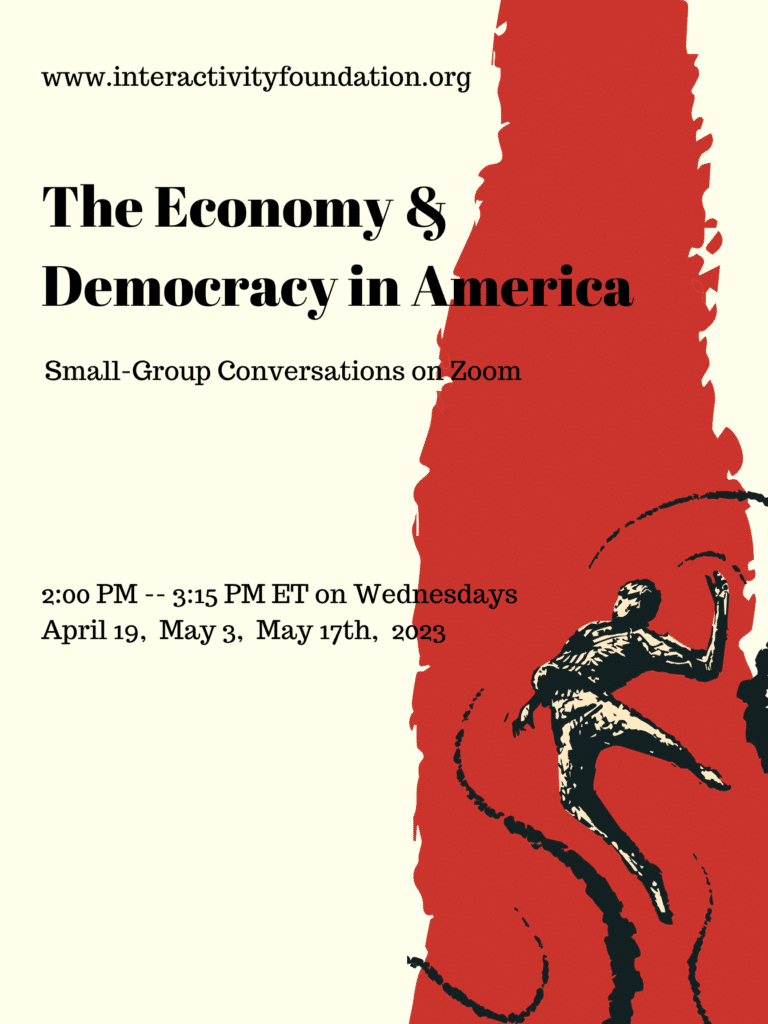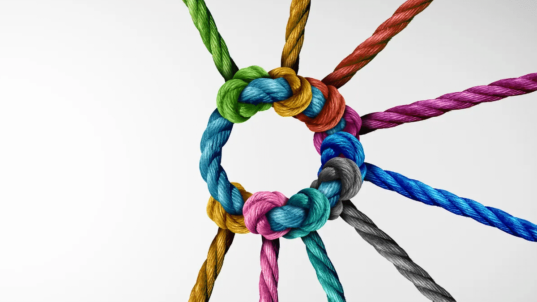
In the first of three sessions of our small-group conversation series on the relationship of the Economy & Democracy in America, participants worked together to explore different aspects of this relationship. They explored key concerns about our economy and how it affects the health of our democracy, including emerging challenges, and possible consequences if these challenges are not addressed. They discussed who benefits from our current system and started developing some initial thoughts about ways to address concerns and better support our democracy. Below is a summary of the different ideas and common themes that emerged from each small-group’s discussion.
Join us for the second discussion in this 3-part series, which will be held this coming Wednesday, May 3rd, at 2:00 pm ET. In this second session, we will focus on questioning what we mean by “The American Dream” and explore our assumptions, myths, dreams, and stories that we tell ourselves about the economy and our democracy. You can register for this 2nd session HERE.
Discussion Summary
What are some of the key concerns and emerging challenges for our economy–and its effects on the health of our democracy?
Concerns about significant and rising economic inequality and its effects on our democracy, including—
- Growing inequality by race/ethnicity, immigration status, region (urban/rural)
- Growing inequality across generations: e.g., how much more expensive it is for younger generations to afford housing, education (higher costs and the effects of significant student loan debt), child care costs, health care, retirement (fewer pensions), etc.
- Significant and continuing gender inequality in wages, working conditions, promotion, and any consideration for vital child care, elder care, etc.
- How inequalities are often created or exacerbated by government policies, including fiscal policies (e.g., tax rates, subsidies, lending policies, etc.)
- How the inequality of economic opportunity clashes with our ideals of a being meritocracy that purports to reward hard work
- Financial fragility in the face of inflation—with growing unaffordability of basic, necessary goods relative to wages, which has a disproportionate effect on the poor and middle class
- Pay equity and continuously rising wage gaps between blue-collar workers and “c-suite” senior level employees
- The growing chasm between the rich and poor and how this destroys solidarity, with a sense of constant competition and anxiety-inducing economic fragility (consider how the COVID pandemic was very different for the wealthy than for everyone else)
Concerns about the effects of capitalism on our democracy, including—
- The rising concentration of great wealth has corrupting effects on our democracy, as the wealthy are able to buy political power, leaving the masses without a voice
- The tension between the demands of corporate profits and what’s in the broader public interest: e.g. a clean environment, stable and functioning communities, living wages, etc.
- How capitalism rewards wealth and unearned income (e.g., capital gains, stock dividends, interest) more than our labor, our hard work
- The emphasis on consumerism, consumption, and mass marketing that intentionally confuses wants and needs
- How capitalism doesn’t necessarily support democracy, considering how China has wedded capitalism to an authoritarian state
- The targeted decline of labor unions, which hurts our democracy by ceding even more political power to the wealthy
- How our traditional economy is not well suited to the diversity of our workforce, including neuro-divergent people
- The inadequacy of our social “safety net” and its effects on our democracy: how it systematically excludes people who are unhoused, hungry, and/or unemployed from voting or otherwise participating in our democracy, leaving them anxious, powerless, distrustful, angry and susceptible to exploitation and authoritarian appeals
- The exposure of local communities to the effects of global capitalism: affecting entire industries and local economies, shifting jobs, affecting housing, etc.
Concerns about the psychological effects of our economy, for example—
- The constant anxiety and stress of trying, and failing, to keep up
- The assumption that wealth implies a higher moral standing and, conversely, that poor people have an inherently lower moral status
- The allure of trying to get rich quick
- The way the constant fear of economic fragility saps the time and energy needed for public engagement in democracy and the needed volunteerism to support our communities
- The anxiety of knowing that world affairs and other matters well beyond our control affect our job prospects, housing costs, even our ability to retire.
- All this fear has a price for both our individual mental health and for our democracy.
Concerns about the economy’s effect on educational opportunities
- The way we’ve shifted the exploding costs of higher education onto students and their families, putting this opportunity out of reach for many
- For students who do start college, fewer are able to finish and they and their families are now burdened with a lifetime of debt, hindering their ability to access housing among other things
- Our current educational system does a poor job of workforce development: there are insufficient alternatives for apprenticeships, internships, skill development
- Our current educational system doesn’t adequately educate students for both the skills and knowledge they’ll need for the future, both with respect to employment skills but also how to understand and make choices within our economy.
Concerns about how our economy and our democracy are failing to provide access to health care, including—
- That health care should be treated as a public good—like social security or public schools
- The way we have a pretend “market” system where providers and insurers set the prices, but patients can’t compare, negotiate, or even know the prices
- That health insurance and medical bills should not be the single highest cost item in a household budget (often exceeding housing), the greatest cause of personal bankruptcy, nor dependent on or differentiated by employment status.
Concerns about different economic sectors and how they relate to our democracy
- How do minimum wage requirements affect small businesses, given that they are one of the most significant employers by sector?
- How do we protect or promote different economic sectors (e.g., manufacturing, energy, transportation, hospitality, retail, farming)–and should we?
Concerns about how our democracy is increasingly dysfunctional and unable to address difficult but fundamental and vital economic issues like—
- Determining which goods should be in the basket of public goods: e.g., national defense, transportation infrastructure, public schools, health care, child care, etc.
- How we might pay for public goods: e.g., subsidize them, raise taxes, or wages, etc.
- Or even just raising the debt limit so as to not crash the US and world economy.
What are some of the “basic needs” that need to be met for people to function as democratic citizens?
- Housing: being un-housed makes it nearly impossible to get or keep a job and receive benefits–and it’s devastating to people’s mental health
- Food
- High quality public education for all, including basic education about the economy–and we should not be subsidizing private schools
- Health care
- Internet access
- A living wage
What are some of the consequences of our current economic system?
- Political polarization makes it difficult to discuss productively, since any alternatives are shut down with labels like “Marxist” or “socialist”
- We focus on immediate results (e.g., more jobs, lower gas prices) but are less able to consider the longer-term consequences
- We’ve destroyed any sense of solidarity: we judge people by their economic success and treat those who lack it (like the poor or unhoused) as criminals
- We will lose democracy if the economic system continues on the current path
- We’re not a democracy any longer: those with power in our plutocracy are just trying to manage the decline and to control the situation as it continues to disintegrate
- We need a revolution in our economy or we’ll have a revolution.
Who does our economy serve? Whose interests shape the economy?
- Those with money and power: it’s about control
- The financial sector: banks, investment firms and their clients: e.g., the shift to student loans, rather than grants, and higher tuition rates
- Larger corporations and economic sectors, and their lobbyists
- Any entity deemed “too big to fail”
- The “incumbents”— whether politicians, stockholders/investors, or high-income workers.
What stories do we tell ourselves about our economy and how are they working for us?
- That we are a “meritocracy”— that our hard work and ability will inevitably be rewarded and overcome any disadvantages of birth, poverty, place, race, or random bad luck
- That “rugged individualism” and “pull yourself up by your own bootstraps” can work for anyone and everyone, including those without boots or straps
- That individual wealth correlates with good moral character: that the rich are deserving, better humans and, conversely, the poor are lesser, undeserving humans
- That free, largely unregulated markets are always and inherently good for society in what they produce and sell and in their longer-term effects
- That vast levels of economic inequality and suffering are inevitable, and just the price of freedom, or far too expensive to address; and not that if the top 1% just paid the taxes they actually owed (instead of evading them), there would be enough to pull nearly everyone out of poverty without raising taxes on the rest of us
- That most all goods and services should be deregulated
- That there are only a very few goods and services (defense, maybe roads and courts) that should be treated as public goods and that any discussion of alternatives is socialism and antithetical to democracy.
What are some changes that we might make so our economy would better serve our democracy?
- Take simple steps to foster more social connection: learn other languages, travel, share meals, get to know and help your neighbors, open doors, listen, do one good thing for another
- Enforce the laws we already have
- Work to restore levels of public trust; seek and tell the truth and encourage everyone to play by the rules of democracy
- Restore trust in our democracy by getting the money out of politics: enact and enforce campaign finance reform to limit the influence of big and dark money interests
- Create and enforce a genuinely progressive tax system that:
- Taxes wealth and unearned income at a higher (not lower) rate than labor
- Uses the revenue to support basic needs like health care, education, affordable housing, and retirement
- Change our values:
- Less emphasis on consumerism, individualism, and economic competition
- More support for our cooperative efforts (what can we do together) and for the inalienable dignity, value, and rights of all people regardless of economic or other circumstances
- Insist that our economy works for people, not the other way around
- Change our laws and public policies to address some of the issues discussed:
- Make health care a public good—everyone pays in, everyone has access
- Provide or subsidize child care
- Enforce existing laws and enact others to ban discrimination based on race/ethnicity, creed, gender, sexual identity, age, etc. in housing, employment, lending, education, etc.
- Support labor and labor unions
- Support small businesses
- Stop attacking public education, improve it, increase access, and greatly increase its funding
- Improve education about how our economy works
- Increase voter participation and engagement across all economic strata by:
- Banning gerrymandering (make redistricting non-partisan)
- Making it easier (not harder) to vote: hold elections on weekends and/or a national holiday, support voting by mail and ballot drop boxes, same-day registration, etc.
- Consider implementing a universal basic income (UBI) as has been tried elsewhere
- Patch the holes and strengthen our social safety net
- Provide universal access to the internet



